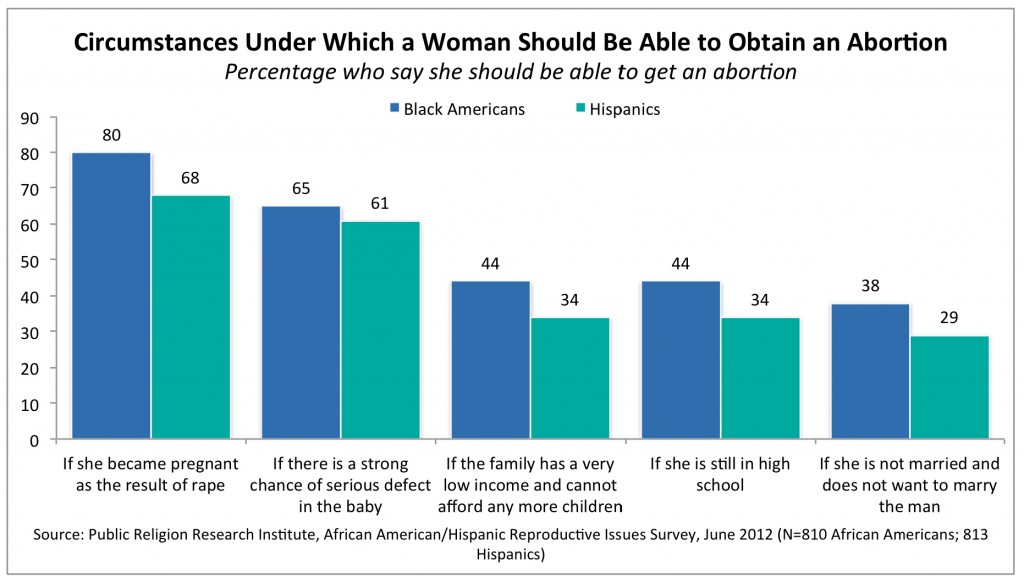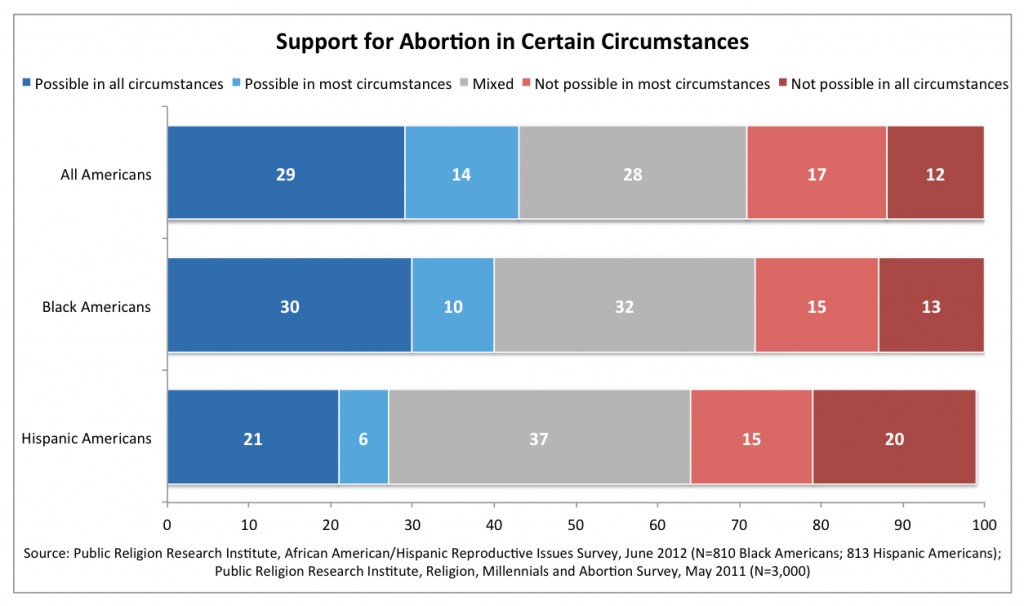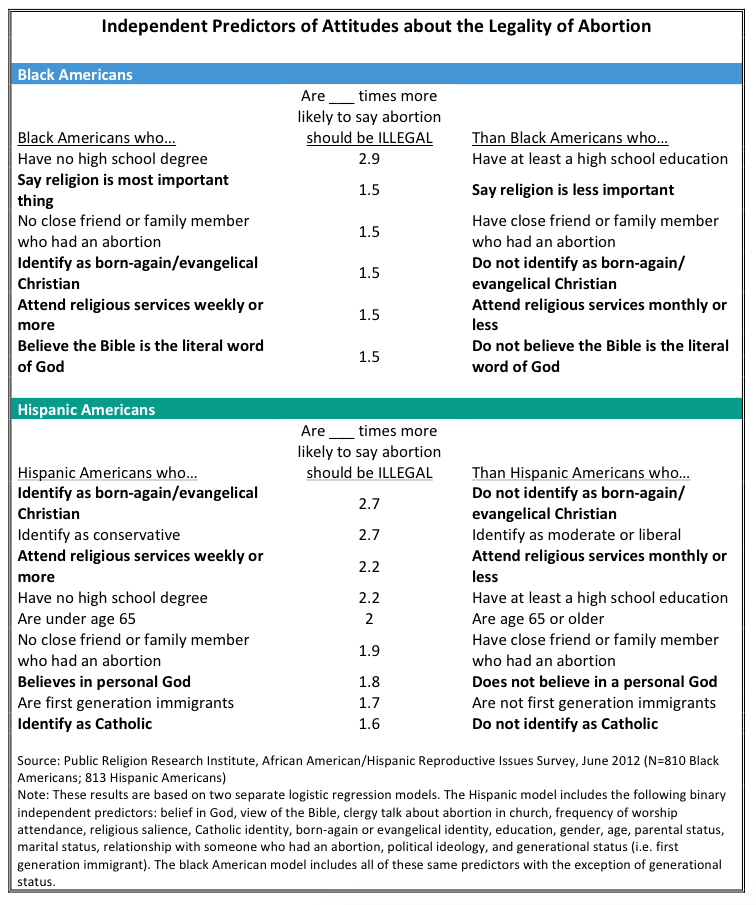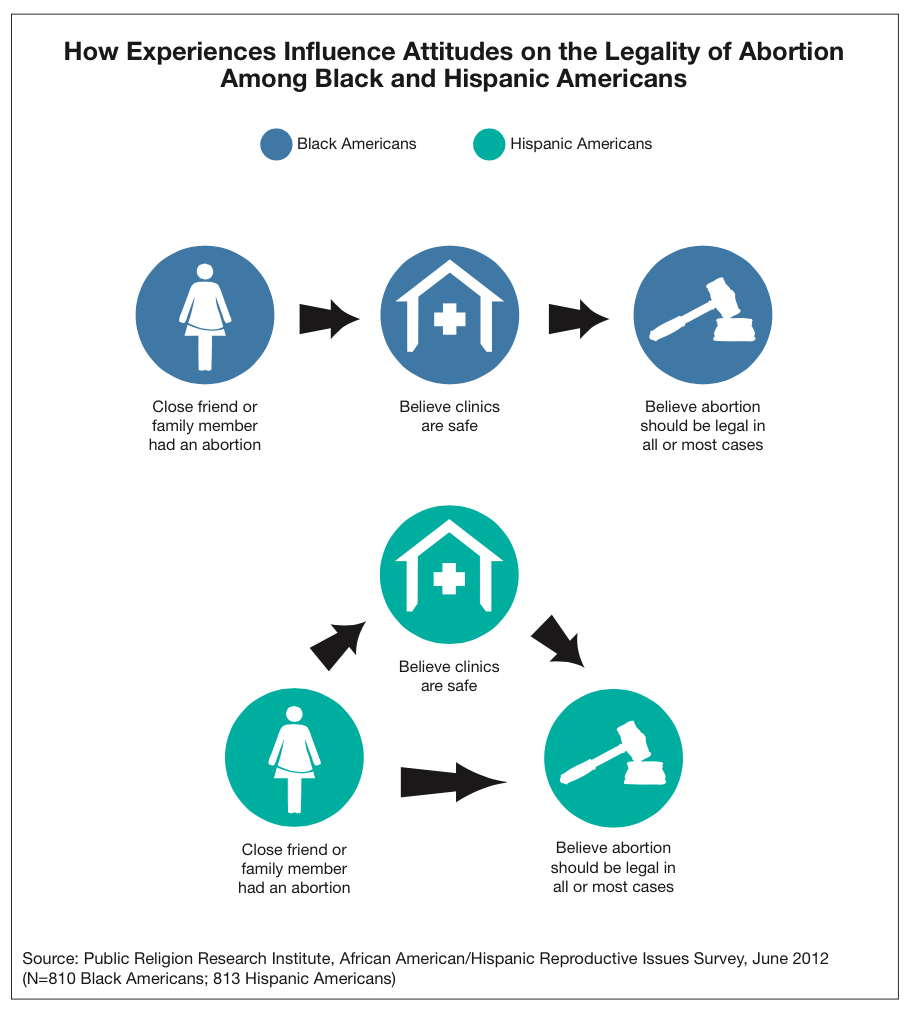Religion, Values, and Experiences: Black and Hispanic American Attitudes on Abortion and Reproductive Issues
Executive Summary
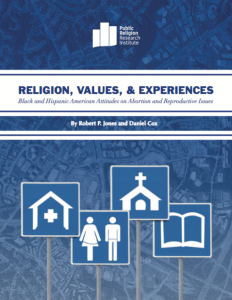 Like Americans overall, the overwhelming majority of black Americans and Hispanic Americans report that the economy is a critical issue facing the country (71% and 75%).
Like Americans overall, the overwhelming majority of black Americans and Hispanic Americans report that the economy is a critical issue facing the country (71% and 75%).
- Relatively few black Americans and Hispanic Americans believe that cultural issues such as abortion (17% and 30%) and same-sex marriage (18% and 26%) are critical issues facing the country.
Both black American and Hispanic American voters strongly support Barack Obama’s reelection as President.
- Nearly 9-in-10 (87%) black voters report that if the election were held today, they would support Barack Obama, while 3% report that they would support Mitt Romney.
- Roughly 6-in-10 (58%) Hispanic voters report that if the election were held today, they would support Obama, while about one-third (32%) say they would support Romney. Hispanic Catholic voters are significantly more likely than Hispanic Protestant voters to say they would vote for Obama (64% vs. 50%).
Black Americans and Hispanic Americans differ significantly in their attitudes regarding the legality of abortion. Two-thirds (67%) of black Americans believe that abortion should be legal in all or most cases, while 30% disagree. By contrast, a slim majority (51%) of Hispanic Americans agree that abortion should be illegal in all or most cases, while 46% say it should be legal in all or most cases.
Attitudes among black Americans and Hispanic Americans on the availability of abortion services in their communities follow a similar pattern. Nearly 6-in-10 (57%) black Americans believe that at least some health care professionals in their community should provide legal abortion, compared to only 42% of Hispanic Americans.
Black Americans are twice as likely to say that increasing the number of restrictions placed on abortion at the state level is a bad thing (46%) rather than a good thing (23%). Hispanic Americans are equally as likely to say that more state-imposed restrictions on abortion are a good thing for society as they are to say that these restrictions are a bad thing for society (38% and 38%).
Black Americans are significantly more likely than Hispanic Americans to believe that abortion clinics are, for the most part, safe. Nearly two-thirds (66%) of black Americans say that abortion clinics are somewhat or very safe. By contrast, fewer than half (47%) of Hispanic Americans believe that abortion clinics are somewhat or very safe.
Black Americans and Hispanic Americans each have a unique set of factors that predict their views on the legality of abortion.
- Among black Americans, level of educational attainment is the strongest single independent predictor of views on the legality of abortion, followed by the relative importance of religion in an individual’s life, having a close friend or family member who has had an abortion, identifying as an evangelical or born-again Christian, frequency of religious attendance, and holding a literal view of the Bible.
- Among Hispanic Americans, the two strongest independent predictors of views on the legality of abortion are political ideology and identification as a born-again or evangelical Christian, followed by frequency of religious attendance, level of educational attainment, age, having a close friend or family member who has had an abortion, belief in a personal God, recent immigrant status, and identification as a Catholic.
- When views about clinic safety are considered alongside demographic and other experiential characteristics, perceptions of clinic safety emerges as the single strongest predictor of views on the legality of abortion.
Roughly 7-in-10 black Americans and Hispanic Americans say that “not judging other people” (72% and 72%) and “showing compassion for women in difficult circumstances” (68% and 68%) are very important in shaping their views on the issue of abortion. Similar numbers of Hispanic Americans but fewer black Americans say that “promoting personal responsibility” is a very important value shaping their views on the legality of abortion (70% vs. 63%).
Like the general public, majorities of black Americans and Hispanic Americans identify as both “pro-life” and “pro-choice.” More than 7-in-10 black Americans (71%) and Hispanic Americans (77%) say that the term “pro-life” describes them somewhat or very well. At the same time, three-quarters (75%) of black Americans and 72% of Hispanic Americans report that “pro-choice” describes them somewhat or very well.
- Compared to Americans overall (37%), both black Americans (52%) and Hispanic Americans (47%) are more likely to hold mixed identities, embracing both labels or neither label.
For Hispanic Americans, views about the morality of abortion are much more closely tied to views about the legality of abortion than they are for black Americans.
- A slim majority (51%) of black Americans—and more than 6-in-10 (61%) Hispanic Americans—believe that having an abortion is morally wrong.
- The vast majority (73%) of Hispanic Americans who believe that having an abortion is morally wrong also say that abortion should be illegal in all or most cases. By contrast, a slim majority (52%) of black Americans who say abortion is morally wrong nevertheless believe that it should be legal in all or most cases.
Among those who attend church at least once or twice a month, Hispanic Americans are significantly more likely than black Americans to report that they hear about the issue of abortion in church (54% vs. 30%).
- Strong majorities of black Americans and Hispanic Americans who say they hear about the issue of abortion in church also report that their clergy say that abortion is morally wrong (68% and 84%).
- Hispanic Catholics are substantially more likely than Hispanic Protestants to say that they hear about abortion during church (62% vs. 41%).
- Clergy speech appears to have no independent effect on black or Hispanic congregants’ attitudes toward the legality of abortion.
Strong majorities of black Americans and Hispanic Americans believe that it is possible to disagree with their religion’s teachings on abortion and still be considered a person of good standing in their faith (78% and 60%).
Overall, black Americans and Hispanic Americans believe contraception is morally acceptable (81% and 79%) and strongly support expanding access to it.
- Over 6-in-10 black Americans (61%) and Hispanic Americans (64%) say that religiously affiliated colleges and hospitals should be required to provide their employees with birth control at no cost.
- Strong majorities of black Americans (92%) and Hispanic Americans (85%) favor expanding birth control access for women who cannot afford it. Hispanic Republicans (67%), while still supportive, are less likely than Hispanic Independents (78%) or Democrats (91%) to favor this policy goal.
- Majorities of black Americans and Hispanic Americans also believe that methods of birth control should be available to teenagers age 16 and older without parental approval (59% and 54%).
Black Americans and Hispanic Americans also support comprehensive sex education in public schools and making HIV testing more available.
- Around 8-in-10 black Americans (84%) and Hispanic Americans (79%) support comprehensive sex education in public schools.
- Black Americans (93%) and Hispanic Americans (91%) are nearly unanimous in their support for making testing and screening for HIV and other sexually transmitted diseases more available.
I. The 2012 Election
Context: Economic Situations of Black Americans and Hispanic Americans
Black Americans and Hispanic Americans have been disproportionately impacted by the recent economic downturn. 1 Both groups have higher rates of unemployment than the national average (14% for black Americans, 11% for Hispanic Americans, and 8% among the general population). 2 Modest majorities of black American and Hispanic American adults report currently working as a paid employee or being self-employed (52% and 57%). About 1-in-5 (17%) black Americans and 13% of Hispanic Americans say they are looking for work. Few report that their current financial situation is excellent or good (38% and 35%). A majority of black Americans and Hispanic Americans report that they are in only fair shape or poor shape financially (60% and 62%). Around one-quarter (23%) of black Americans and more than one-third (34%) of Hispanic Americans report that they do not have health insurance.
Despite the economic challenges facing both groups, black Americans are decidedly more optimistic than Hispanic Americans with regard to their personal financial situation. Half (50%) of black Americans believe that their personal financial situation will improve in the next 12 months. About 4-in-10 (43%) say it will stay about the same and only 6% believe it will get worse. Among Hispanic Americans, fewer than 3-in-10 (28%) believe their financial situation will improve over the next year. More than half (54%) say it will stay about the same and nearly 1-in-5 (17%) believe things will get worse.
Issue Priorities
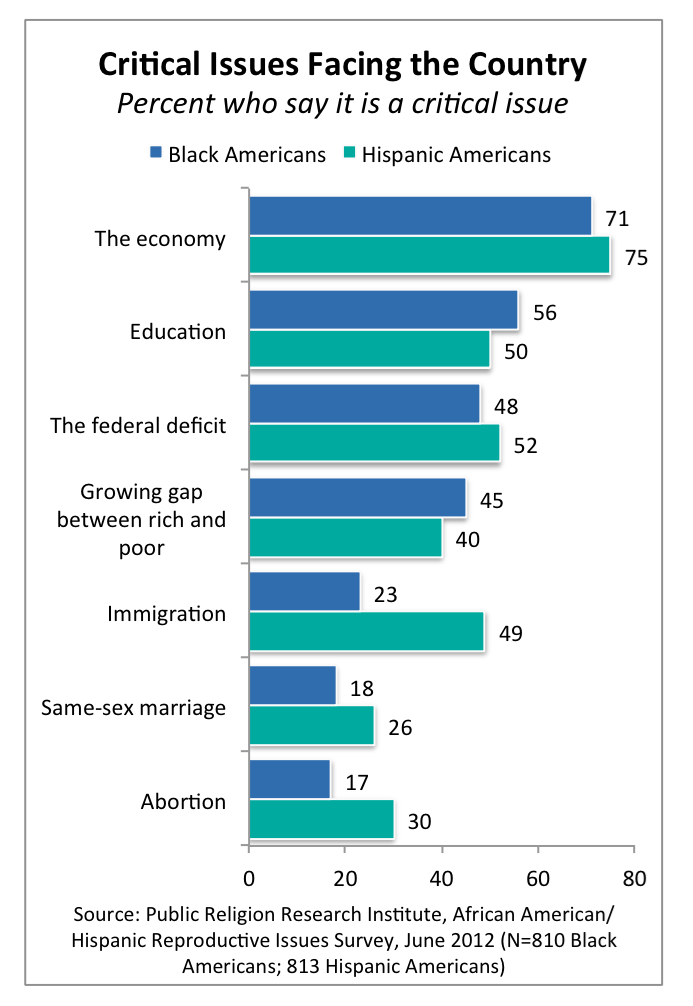 Like Americans overall, the overwhelming majority of black Americans and Hispanic Americans report that the economy is a critical issue facing the country (71% and 75%). 3 A majority (56%) of black Americans and half (50%) of Hispanic Americans say that education is also a critical issue. Roughly half of both groups name the federal deficit as a critical issue (48% and 52%).
Like Americans overall, the overwhelming majority of black Americans and Hispanic Americans report that the economy is a critical issue facing the country (71% and 75%). 3 A majority (56%) of black Americans and half (50%) of Hispanic Americans say that education is also a critical issue. Roughly half of both groups name the federal deficit as a critical issue (48% and 52%).
Approximately 4-in-10 black Americans (45%) and Hispanic Americans (40%) believe that the growing gap between the rich and the poor is a critical issue. Hispanic Americans are twice as likely as black Americans to report that immigration is a critical issue (49% vs. 23%).
Relatively few black Americans and Hispanic Americans believe that abortion (17% and 30%) and same-sex marriage (18% and 26%) are critical issues. However, there is a significant gender divide on views of abortion among black Americans: black women are more likely than black men to claim that the issue of abortion is critical (24% vs. 9%), although it is still a low priority. There are no differences by gender among Hispanic Americans.
Likelihood of Voting in 2012
More than 8-in-10 (83%) black Americans report being registered to vote in their current precinct or election district. There are no differences in registration status between black men and women, but black Millennials (age 18 to 29) are significantly less likely to be registered to vote than black Americans age 30 and older (63% vs. 89%).
Relatedly, less than half (48%) of black Americans under the age of 30 say that they are absolutely certain they will vote in the upcoming presidential election. More than one-third (35%) say their chance of voting is 50-50 or less. By contrast, nearly 8-in-10 (78%) black Americans age 30 or older say they are absolutely certain they will vote.
The pattern among Hispanic Americans is somewhat different. Overall, slightly more than half (52%) of Hispanic Americans are registered to vote. A registration gap is evident between black Millennials and black Americans age 30 and over, but among Hispanic Americans, a registration gap appears between Hispanic Americans under the age of 50 and Hispanic Americans over the age of 50. Fewer than half of Hispanic Millennials (45%) and Hispanic Americans ages 30-49 (44%) report that they are currently registered to vote. By contrast, three-quarters (75%) of Hispanic Americans age 50 or older are registered to vote. There are no differences between Hispanic men and women.
Only about one-third (34%) of Hispanic Americans under the age of 50 say they are absolutely certain to vote in the upcoming election. Among Hispanic Americans who are age 50 or older, 68% say they are certain to vote.
The 2012 Vote (Among Registered Voters)
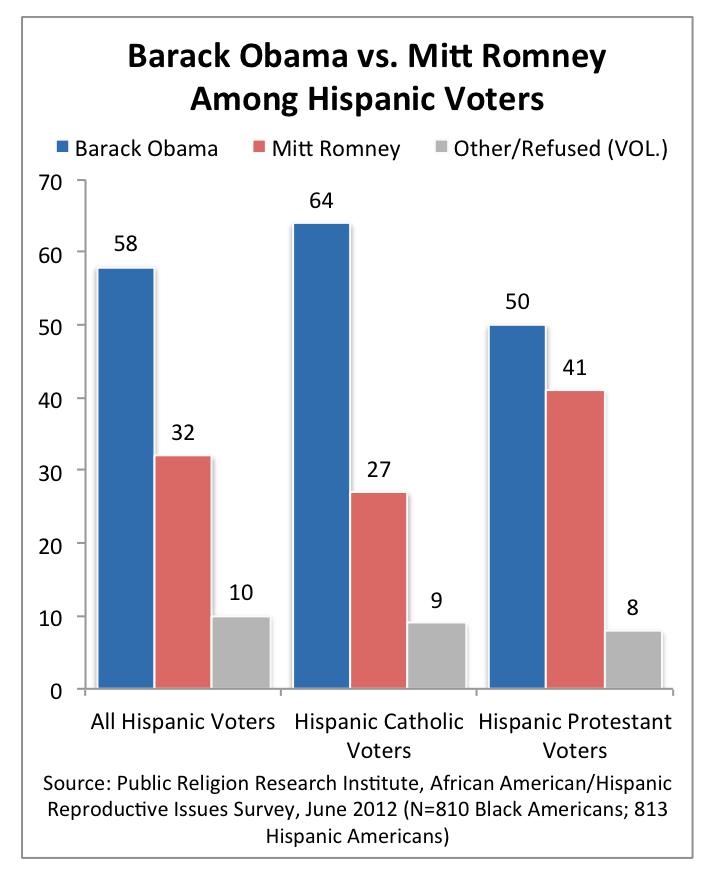 Nearly 9-in-10 (87%) black voters report that if the election were held today, they would support Barack Obama, while 3% report that they would support Mitt Romney. One in ten (10%) say they are not sure, or would not vote. There are no significant differences in support for Obama among black Americans by gender, age, religious affiliation, or level of educational attainment.
Nearly 9-in-10 (87%) black voters report that if the election were held today, they would support Barack Obama, while 3% report that they would support Mitt Romney. One in ten (10%) say they are not sure, or would not vote. There are no significant differences in support for Obama among black Americans by gender, age, religious affiliation, or level of educational attainment.
Roughly 6-in-10 (58%) Hispanic voters report that if the election were held today, they would support Obama, while about one-third (32%) say they would support Romney. Obama’s lead differs significantly between Hispanic Catholic and Protestant voters. Among Hispanic Catholic voters, nearly two-thirds (64%) report that they would vote for Obama, compared to half (50%) of Hispanic Protestant voters. More than 4-in-10 (41%) Hispanic Protestant voters report that they would vote for Romney, compared to 27% of Hispanic Catholic voters.
Views of Obama and Romney
Black Americans overwhelmingly approve of President Obama’s job performance. Eighty-four percent say they approve, while less than 1-in-10 (8%) disapprove.
Hispanic Americans are more critical of Obama’s job performance, but are still supportive. Roughly 6-in-10 (59%) say they approve of how Obama is handling his job as president, while nearly one-third (32%) disapprove. Two-thirds (67%) of Hispanic Millennials say they approve of how Obama is handling his job as president, compared to 56% of Hispanic Americans age 30 or older.
Views of Obama among black Americans are uniformly positive. Nine-in-ten have a very (63%) or somewhat (27%) favorable view of the President. Less than 1-in-10 (7%) say they have an unfavorable opinion of Obama. Views do not differ by gender, age, education, or religious affiliation. Conversely, black Americans’ views of Romney are consistently negative. Only 14% of black Americans say they have a favorable view of Romney, while more than three-quarters (76%) say they have an unfavorable view of the GOP nominee.
Hispanic Americans’ views of Obama are positive overall. Two-thirds (67%) say they have a very or somewhat favorable view of Obama, while roughly 3-in-10 (29%) have an unfavorable view. Hispanic Americans maintain fairly negative views about Romney. Less than one-third (32%) say they have a favorable opinion of Romney, while 6-in-10 (60%) say they view the GOP nominee unfavorably.
II. Health Care, Reproductive Health Services, and Sex Education
The Affordable Care Act
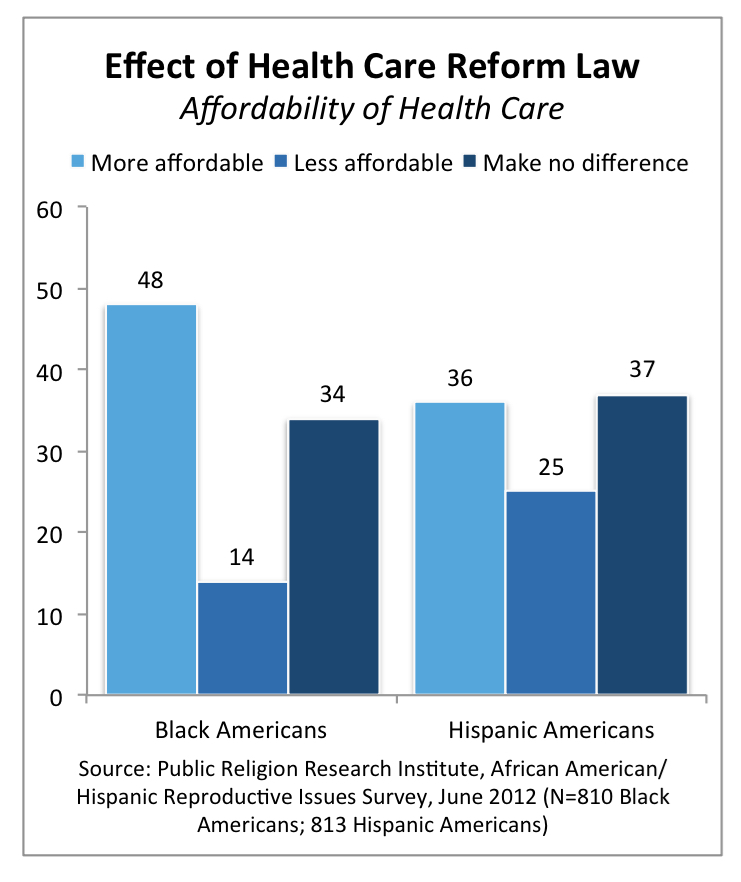 Black Americans are much more likely to believe that the Affordable Care Act will have a positive influence on the cost and availability of health insurance than they are to believe its impact will be negative. Nearly half (48%) of black Americans say that the health care reform law will make health care more affordable for most Americans. Fourteen percent say it will make health care less affordable, and roughly one-third (34%) say it will make no difference.
Black Americans are much more likely to believe that the Affordable Care Act will have a positive influence on the cost and availability of health insurance than they are to believe its impact will be negative. Nearly half (48%) of black Americans say that the health care reform law will make health care more affordable for most Americans. Fourteen percent say it will make health care less affordable, and roughly one-third (34%) say it will make no difference.
A majority (52%) of black Americans believe that the law will result in more Americans with health insurance coverage. Sixteen percent say that it will lead to fewer people with coverage, and about 3-in-10 (29%) say the law will not make any difference in the number of people with health care coverage.
Interestingly, black Americans who do not currently have health care insurance are decidedly more pessimistic than those who do about the law’s impact. Around 4-in-10 (39%) black Americans without insurance believe that the health care law will make coverage more affordable, compared to 52% of those with insurance. Similarly, less than 4-in-10 (38%) black Americans without insurance believe it will lead to more insured Americans, compared to 57% of the insured.
Hispanic Americans’ attitudes toward the Affordable Care Act are more mixed. Thirty-six percent believe that the law will make health care more affordable, 25% say it will make health care less affordable, and 37% believe the law will not have any effect on the cost of health care.
Hispanic Americans have a more positive outlook on the law’s effect on coverage than on cost. Close to half (45%) believe it will lead to an increase in the number of people with insurance, compared to 18% who say it will result in fewer people with coverage. About one-third (34%) of Hispanic Americans believe the law will not have any impact on the number of people with health care coverage. There are no differences in the attitudes of Hispanic Americans with and without health care coverage.
Perspectives on Contraception Coverage Requirements
When asked their opinions about the ongoing debate over a new government policy which would require certain organizations to provide birth control to their employees at no cost, black Americans and Hispanic Americans make a clear distinction between churches or houses of worship on the one hand, and religiously affiliated colleges and hospitals on the other. Less than half of black Americans (48%) and Hispanic Americans (47%) agree that churches and other places of worship should be required to provide no-cost birth control for their employees. However, strong majorities of black Americans (61%) and Hispanic Americans (64%) say that religiously affiliated colleges and hospitals should be required to provide their employees with no-cost birth control. Around 7-in- 10 black Americans (69%) and Hispanic Americans (70%) agree that publicly held corporations should be required to provide no-cost birth control to their employees.
There is agreement among Hispanic Catholics and Protestants that religiously affiliated colleges and hospitals (68% and 63%) and publicly held corporations (72% and 69%) should have to provide their employees with health care plans that cover contraception. However, Hispanic Catholics and Protestants are at odds in their views about churches. A majority (54%) of Hispanic Catholics believe that churches and other places of worship should be required to provide health care coverage that includes contraception, compared to about 4-in-10 (41%) Hispanic Protestants. A majority (57%) of Hispanic Protestants say that churches should not be required to provide this type of coverage.
Religious Liberty
Black Americans and Hispanic Americans are divided over whether the right of religious liberty is being threatened in America today. A slim majority (52%) of black Americans believe that the right of religious liberty is under threat in America today, compared to 44% who disagree. Half (50%) of Hispanic Americans agree that the right of religious liberty is not being threatened in America today, compared to 46% who disagree.
There are significant generational divides on this issue. Black Millennials (age 18-29) are more likely than black seniors (age 65 and up) to agree that religious liberty is under threat today (54% vs. 35%). For Hispanic Americans, however, the reverse is true. Fewer than half (41%) of Hispanic Millennials believe that religious liberty is being threatened today, compared to over 6-in-10 (62%) seniors.
There are also differences among black Americans according to levels of educational attainment. A majority (56%) of black Americans with a high school education or less agree that the right of religious liberty is being threatened in America today, compared to only 4-in-10 (40%) black Americans with a college degree. There are no sizeable differences among Hispanic Americans with varying levels of educational attainment.
Expanding Access to Birth Control
Strong majorities of black Americans (92%) and Hispanic Americans (85%) favor expanding birth control access for women who cannot afford it. There are no significant differences by gender, generation, level of educational attainment, or religious affiliation, but Hispanic Republicans (67%), while still supportive, are less likely than Hispanic Independents (78%) or Democrats (91%) to favor such a policy.
Majorities of black Americans and Hispanic Americans also believe that methods of birth control should be available to teenagers age 16 and older without parental approval (59% and 54%). However, Hispanic Americans are politically divided on this question. While roughly 6-in-10 (63%) Hispanic Democrats favor birth control access without parental approval for teens age 16 and over, only 43% of Hispanic Republicans agree. Hispanic Independents are nearly evenly divided, with a slim majority (51%) in favor of birth control access for teens who are at least 16 and 48% opposed.
There is also some generational disagreement among black Americans on whether birth control should be available to teens who are at least 16 without parental permission. For example, 7-in-10 (70%) black Millennials agree that birth control should be available to teens age 16 and over without parental permission, compared to only 49% of black seniors.
Testing for Sexually Transmitted Diseases
Black Americans (93%) and Hispanic Americans (91%) are nearly unanimous in their support for making testing and screening for HIV and other sexually transmitted diseases more available. There are no significant differences by gender, generation, religious affiliation, political affiliation, or level of educational attainment among either group.
Comprehensive Sex Education in Public Schools
Around 8-in-10 black Americans (84%) and Hispanic Americans (79%) also support comprehensive sex education in public schools. Hispanic Republicans (68%) are slightly less likely to support comprehensive sex education in public schools, compared to Hispanic Independents (77%) and Hispanic Democrats (89%). There are no other differences by gender, generation, religious affiliation, or level of educational attainment.
III. Abortion: Legality, Access, and Safety
The Legality of Abortion
Black Americans and Hispanic Americans differ substantially on the legality of abortion. Two-thirds (67%) of black Americans believe that abortion should be legal in all or most cases, while 30% disagree. By contrast, a slim majority (51%) of Hispanic Americans believe that abortion should be illegal in all or most cases, while 46% disagree.
A majority of Hispanic Protestants (60%) and Hispanic Catholics (53%) say abortion should be illegal in all or most cases. However, there are dramatic differences between Hispanic Americans who attend religious services at least weekly and those who seldom or never attend. Fewer than 1-in-4 (23%) Hispanic Americans who attend church at least weekly believe that abortion should be legal in all or most cases, compared to nearly two- thirds (65%) of Hispanic Americans who seldom or never attend church. Half (50%) of Hispanic Americans who attend services occasionally (a few times a year or once or twice a month) say abortion should be legal in most or all cases.
Higher educational levels are associated with more supportive views of legal abortion among both black Americans and Hispanic Americans. Fewer than 4-in-10 (37%) Hispanic Americans with a high school education or less believe that abortion should be legal in all or most cases, compared to nearly two-thirds (66%) of Hispanic Americans with a college degree. Similarly, 66% of black Americans with a high school education or less say that abortion should be legal in all or most cases, compared to 81% of black Americans with a college degree.
Finally, there are significant differences between Hispanic Americans who were born in the U.S. (second or third generation) and Hispanic Americans who were born in another country (first generation). Among first generation Hispanic Americans roughly 4-in-10 (41%) say abortion should be legal in all or most cases, while nearly 6-in-10 (57%) say it should be illegal in all or most cases. By contrast, a majority of second generation (55%) and third generation (57%) Hispanic Americans say abortion should be legal in all or most cases.
Abortion and Circumstances
Overall, black Americans and Hispanic Americans make sharp distinctions between the circumstances under which a pregnant woman should be able to obtain a legal abortion. However, black Americans are generally more likely than Hispanic Americans to believe that abortion should be possible under each of these specific circumstances.
Majorities of black Americans and Hispanic Americans agree that a pregnant woman should be able to obtain a legal abortion if she became pregnant as a result of rape (80% and 68%), or if there is a strong chance of a serious defect in the baby (65% and 61%). By contrast, less than half of black Americans and Hispanic Americans believe that abortion should be possible if the primary reason for the abortion is that the family has a very low income and cannot afford any more children (44% and 34%), if the pregnant woman is still in high school (44% and 34%), or if the pregnant woman is not married and does not want to marry the man (38% and 29%).
Although Hispanic Protestants and Catholics do not differ greatly on the circumstances under which they believe obtaining a legal abortion should be possible, Hispanic Americans who seldom or never attend church diverge significantly from Hispanic Americans who attend church more frequently. For example, while three-quarters (75%) of Hispanic Americans who seldom or never attend church believe that pregnant women should be able to seek an abortion if there is a strong chance of serious defect in the baby, less than 4-in-10 (38%) Hispanic Americans who attend church at least weekly agree. Similarly, while half (50%) of Hispanic Americans who seldom or never attend church believe that a pregnant woman should be able to seek an abortion if she is still in high school, only 15% of Hispanic Americans who attend church at least weekly agree.
In order to provide a more complete picture of black Americans’ and Hispanic Americans’ attitudes about the relative permissibility of abortion in specific circumstances, we created a composite scale that combines these five measures.4 The pattern of responses shows that black Americans are more likely to believe abortion should be possible than Hispanic Americans. However, black Americans remain roughly similar to the general public overall.
Four-in-ten black Americans believe that abortion should be possible under all circumstances (30%) or most circumstances (10%). Roughly one-third (32%) believe it should be possible in some circumstances but not in others, and less than 3-in-10 believe it should not be possible under most circumstances (15%) or any circumstances (13%). By contrast, less than 3-in-10 Hispanic Americans believe abortion should be possible under all circumstances (21%) or most circumstances (6%). Nearly 4-in-10 (37%) Hispanic Americans believe that abortion should be possible in some circumstances but not in others, and more than one-third believe that abortion should not be possible under most circumstances (15%) or any circumstances (20%).
Access to Abortion Services
Nearly 6-in-10 (57%) black Americans believe that at least some health care professionals in their community should provide legal abortions, compared to only 42% of Hispanic Americans. There is a gender divide among black Americans on this issue: black men are more likely than black women to believe that at least some health care professionals in their community should provide legal abortions (65% vs. 50%). However, there are no other significant demographic differences among black Americans.
There are, however, substantial divisions among Hispanic Americans by level of educational attainment and fre-uency of religious attendance. A majority (56%) of Hispanic Americans with a college degree believe that at least some health care professionals in their community should provide abortions, compared to 33% of Hispanic Americans with a high school education or less. Similarly, a majority (56%) of Hispanic Americans who seldom or never attend church think that legal abortion should be available in their community, compared to 23% of Hispanic Americans who attend church weekly or more.
In addition, there are some differences between first-generation Hispanic Americans and Hispanic Americans whose parents were born in the United States. Hispanic Americans who were not born in the United States are much less likely to believe that at least some health care professionals in their community should provide legal abortions than second or third generation Hispanic Americans (33%, 56%, and 58%, respectively).
Black Americans are slightly less likely than Hispanic Americans to believe that it is very or somewhat difficult to obtain an abortion in their community (36% vs. 44%). Roughly 6-in-10 (61%) black Americans and half (50%) of Hispanic Americans say that it is somewhat or very easy to obtain an abortion in their community.
Perspectives on State Restrictions
Following the pattern outlined above, black Americans are more likely than Hispanic Americans to believe that more states placing restrictions on the availability of abortion is a bad thing for society. Black Americans are twice as likely to say that increasing the number of restrictions placed on abortion at the state level is a bad thing, rather than a good thing (46% vs. 23%). Roughly 3-in-10 (28%) black Americans say this trend doesn’t make a difference either way. Hispanic Americans are equally as likely to say that more state-imposed restrictions on abortion are a good thing for society as they are to say that these restrictions are a bad thing (38% and 38%). One-in-five (20%) Hispanic Americans say that this trend does not make a difference.
Perceptions of Clinic Safety
Black Americans are significantly more likely than Hispanic Americans to believe that abortion clinics are, for the most part, safe. Nearly two-thirds (66%) of black Americans say that abortion clinics are somewhat or very safe, compared to 32% who say that clinics are not too safe or not at all safe. By contrast, fewer than half (47%) of Hispanic Americans believe that abortion clinics are somewhat or very safe, while 50% say that clinics are not too safe or not at all safe. Hispanic Americans are twice as likely as black Americans to believe that abortion clinics are not at all safe (24% vs. 12%).
Among both groups, perceptions of clinic safety vary significantly according to level of educational attainment. While a majority (56%) of black Americans with a high school education or less believe that abortion clinics are very or somewhat safe, college- educated black Americans (84%) are nearly 30 points more likely to affirm the safety of abortion clinics. Similarly, fewer than 4-in-10 (38%) Hispanic Americans with a high school education or less believe that abortion clinics are very or somewhat safe, compared to 62% of college-educated Hispanic Americans.
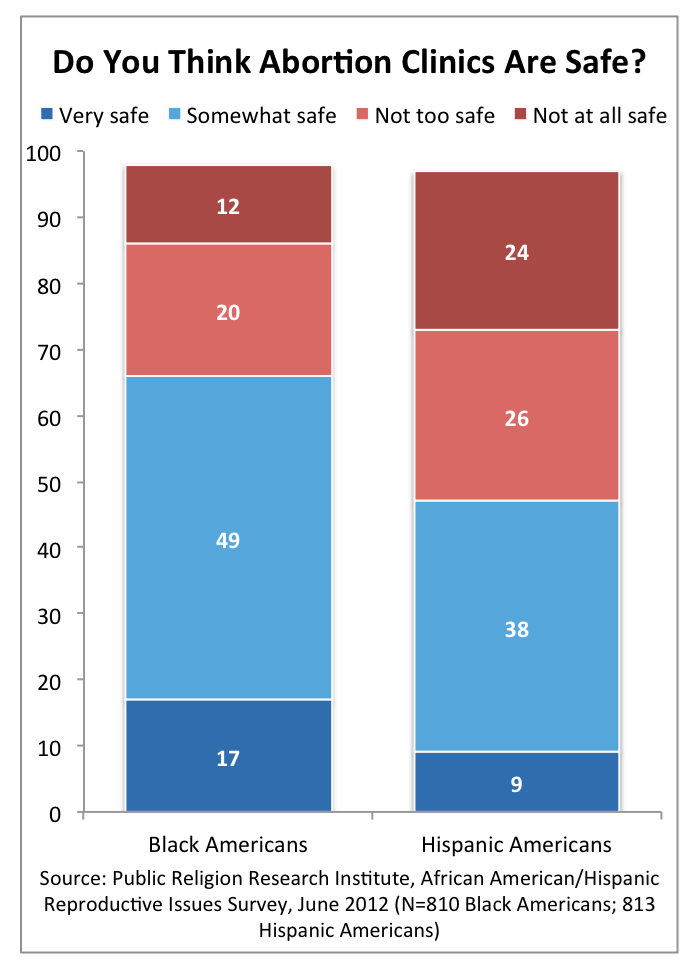 A personal connection to someone who has had an abortion also influences black Americans’ and Hispanic Americans’ perceptions of clinic safety. Nearly 6-in-10 (57%) black Americans report that they have a close friend or family member who has had an abortion, compared to 39% of Hispanic Americans. Three-quarters (75%) of black Americans who report that they have a close friend or family member who has had an abortion say that abortion clinics are somewhat or very safe, compared to only 55% of black Americans who do not have this connection. Similarly, nearly two- thirds (65%) of Hispanic Americans who have a close friend or family member who has had an abortion say that abortion clinics are somewhat or very safe, compared to only 36% of Hispanic Americans without this relationship.
A personal connection to someone who has had an abortion also influences black Americans’ and Hispanic Americans’ perceptions of clinic safety. Nearly 6-in-10 (57%) black Americans report that they have a close friend or family member who has had an abortion, compared to 39% of Hispanic Americans. Three-quarters (75%) of black Americans who report that they have a close friend or family member who has had an abortion say that abortion clinics are somewhat or very safe, compared to only 55% of black Americans who do not have this connection. Similarly, nearly two- thirds (65%) of Hispanic Americans who have a close friend or family member who has had an abortion say that abortion clinics are somewhat or very safe, compared to only 36% of Hispanic Americans without this relationship.
Hispanic Americans whose parents were born in the United States also tend to place more trust in the safety of abortion clinics. Over 6-in-10 (61%) Hispanic Americans with two parents born in the United States say that abortion clinics are very or somewhat safe, compared to only 39% of Hispanic Americans with two parents who were born in another country.
IV. Values, Morality, Identity, and Abortion
Many Values Inform Views on Abortion
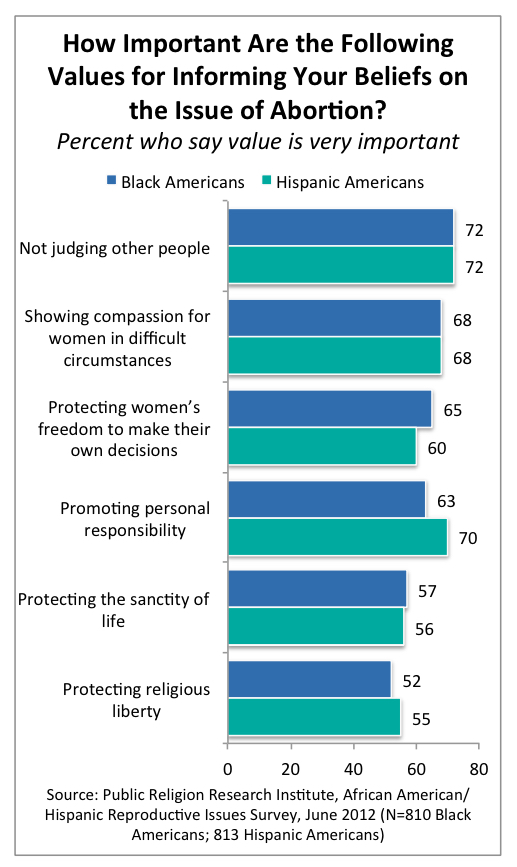 Black Americans and Hispanic Americans are influenced by a wide range of values on the issue of abortion, although the relative importance of these values varies substantially between the two groups.
Black Americans and Hispanic Americans are influenced by a wide range of values on the issue of abortion, although the relative importance of these values varies substantially between the two groups.
Roughly 7-in-10 black Americans say that “not judging other people” (72%) and “showing compassion for women in difficult circumstances” (68%) are very important in shaping their views on the issue of abortion. More than 6-in-10 say that “protecting women’s freedom to make their own decisions” (65%) and “promoting personal responsibility” (63%) are very important values. Majorities of black Americans say that “protecting the sanctity of life” (57%) and “protecting religious liberty” (52%) are very important values. There are no significant differences in the relative importance of these values by age, gender, level of educational attainment, and religious affiliation.
Like black Americans, about 7-in-10 Hispanic Americans report that “not judging other people” (72%), “promoting personal responsibility” (70%), and “showing compassion for women in difficult circumstances (68%) are very important values for informing their beliefs on abortion. Smaller majorities of Hispanic Americans say that “protecting women’s freedom to make their own decisions” (60%), “protecting the sanctity of life” (56%), and “protecting religious liberty” (55%) are very important values. As with black Americans, there are no significant differences among Hispanic Americans in the relative importance of these values by age, gender, level of educational attainment, and religious affiliation.
However, Hispanic Americans who were born outside the United States (first generation) are significantly more likely to say that the value of “protecting religious liberty” is very important for informing their views on abortion than are third generation Hispanic Americans (60% vs. 43%). Half (50%) of second generation Hispanic Americans report that this value is very important.
Responsibility
To better understand how black Americans and Hispanic Americans conceptualize responsibility in the context of decisions about abortion, we asked respondents to react to two statements – one which claimed that abortion was a selfish decision, and one which declared that abortion could be a responsible choice.
As noted above, black Americans are less likely than Hispanic Americans to say that promoting personal responsibility is a very important value in shaping their view on abortion. Black Americans also offer more consistent answers than Hispanic Americans to the two questions on abortion and responsibility. Fewer than 4-in-10 (36%) black Americans agree that “having an abortion is a selfish decision that allows a woman to avoid taking responsibility,” while six-in-ten (60%) reject this statement. Consistent with these views, 7-in-10 (70%) black Americans agree that “in certain circumstances, having an abortion is the most responsible decision a woman can make,” while one-quarter (25%) disagree.
Hispanic Americans exhibit greater ambivalence on the issue of responsibility, with solid majorities in agreement with both statements. A majority (55%) of Hispanic Americans agree that having an abortion is a selfish decision that allows a woman to avoid taking responsibility, while less than half (43%) disagree. Similarly, more than two- thirds (68%) agree that under certain circumstances, having an abortion is the most responsible decision a woman can make, while nearly 3-in-10 (29%) disagree.
“Pro-Life” and “Pro-Choice” Identities
Most Americans do not identify solely with either the “pro-choice” or the “pro-life” label, but say that both terms describe them at least somewhat well. Black Americans and Hispanic Americans are no exception to this general pattern. More than 7-in-10 black Americans (71%) and Hispanic Americans (77%) say that the term “pro-life” describes them somewhat or very well. At the same time, three-quarters (75%) of black Americans and 72% of Hispanic Americans report that “pro-choice” describes them somewhat or very well. Compared to Americans overall, black Americans and Hispanic Americans are much less likely to strongly identify with either label.
In order to make sense of these dual and dueling identities, we constructed a scale that combined each identity question and weighted the degree to which a respondent identified as “pro-choice” or “pro-life” (Q15a and Q15b).5 This scale enabled us to separate the respondents who embrace one label while rejecting the other from those who embrace both or who embrace neither.
Compared to Americans overall (37%), both black Americans (52%) and Hispanic Americans (47%) are more likely to hold mixed identities, embracing both labels or neither label.6 Black Americans are more likely to identify as “pro-choice” (29%) than “pro-life” (19%). By contrast, Hispanic Americans are more likely to identify as “pro-life” (31%) than “pro-choice” (21%).
There are significant differences among both black Americans and Hispanic Americans by level of educational attainment. College-educated black Americans are about half as likely as black Americans with a high school education or less to report a mixed identity or to claim no particular identity (31% vs. 59%). College-educated black Americans are also more than twice as likely as those with a high school education or less to identify as “pro-choice” (53% vs. 21%). A similar pattern is evident among Hispanic Americans. College-educated Hispanic Americans are much less likely than Hispanic Americans with a high school education or less to claim a mixed identity (37% vs. 53%).
There are no differences in the degree to which black Americans and Hispanic Americans identify with these labels by age, gender, party affiliation, or religious affiliation.
Morality of Abortion
Previous research has shown that in making judgments about the issue of abortion, Americans draw distinctions between morality and legality.7 Although most surveys show that a majority of Americans believe abortion should be legal in at least some cases, similar numbers believe that the decision to have an abortion is morally wrong. Among black Americans and Hispanic Americans, there is also a significant gap between views about the legality of abortion and assessments of its moral acceptability.
A slim majority (51%) of black Americans and more than 6-in-10 (61%) Hispanic Americans believe that having an abortion is morally wrong. One third (33%) of black Americans say that abortion is morally acceptable, compared to one-quarter (25%) of Hispanic Americans. Among both groups, approximately 1-in-10 volunteer that abortion is a personal, rather than a moral, decision or that the morality of abortion depends on the situation (8% each).
There are significant differences between black men and women. Nearly 6-in-10 (57%) black women believe having an abortion is morally wrong, compared to 43% of black men. Some of this is likely due to the higher rates of religious attendance among women. Black Americans who attend religious services at least once a week are much more likely to believe abortion is morally wrong than those who seldom or never attend (62% vs. 40%).
Among Hispanic Americans, there are significant differences by level of educational attainment and religious affiliation on the morality of abortion; however, there are no differences between men and women. Hispanic Americans without a college education differ significantly from those with a college degree. Seven-in-ten (70%) Hispanic Americans with a high school education or less say that having an abortion is morally wrong, compared to less than half (45%) of those with a college education.
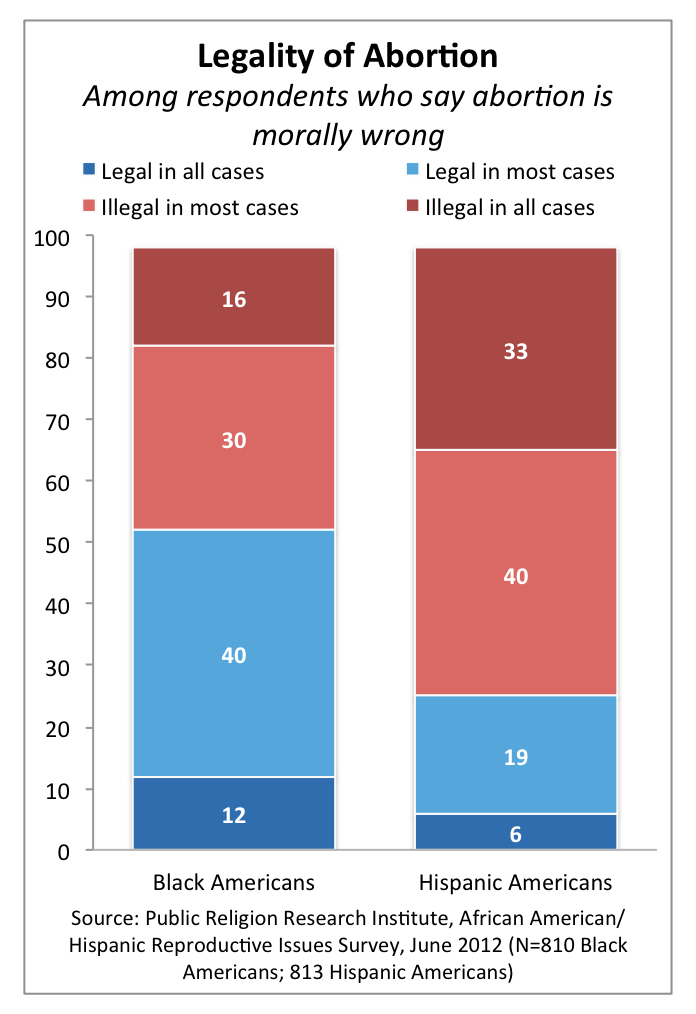 Hispanic Protestants are more likely than Hispanic Catholics to believe that having an abortion is morally wrong (75% vs. 59%). In addition, as with black Americans, there are considerable differences in the views of Hispanic Americans who attend church at least once a month compared to those who seldom or never attend religious services. Three-quarters (75%) of Hispanic Americans who attend services at least weekly believe that having an abortion is morally wrong, compared to less than half (46%) of Hispanic Americans who seldom or never attend.
Hispanic Protestants are more likely than Hispanic Catholics to believe that having an abortion is morally wrong (75% vs. 59%). In addition, as with black Americans, there are considerable differences in the views of Hispanic Americans who attend church at least once a month compared to those who seldom or never attend religious services. Three-quarters (75%) of Hispanic Americans who attend services at least weekly believe that having an abortion is morally wrong, compared to less than half (46%) of Hispanic Americans who seldom or never attend.
For Hispanic Americans, views about the morality of abortion are much more closely tied to views about the legality of abortion than they are for black Americans. Nearly three-quarters (73%) of Hispanic Americans who believe having an abortion is morally wrong also say that it should be illegal in all or most cases, while only one-quarter (25%) believe it should be legal. By contrast, a majority (52%) of black Americans who say abortion is morally wrong nevertheless believe that it should be legal in all or most cases, while less than half (46%) believe it should be illegal in all or most cases.
Both groups’ perspectives on the morality of other behaviors vary considerably. Majorities of black Americans and Hispanic Americans believe that sex between a young man and woman under the age of 18 is morally wrong (60% and 58%). And similar numbers believe that sex between two adults of the same gender is morally wrong (61% and 55%). Black Americans and Hispanic Americans are, however, each more divided on the morality of having children out of wedlock. Around half of black Americans (50%) and Hispanic Americans (52%) say that this is morally acceptable. And overwhelming majorities of black Americans and Hispanic Americans believe that the use of artificial birth control or contraception is morally acceptable (81% and 79%), including 80% of Hispanic Protestants and 82% of Hispanic Catholics.
V. Religious Institutions and Leaders
Issues Discussed in Church
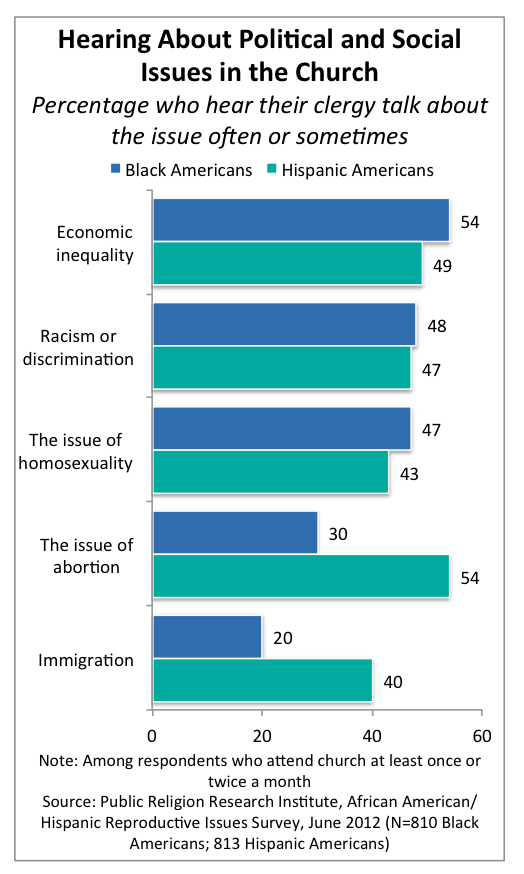 Among those who attend church at least once or twice a month, Hispanic Americans are significantly more likely than black Americans to report that they hear about the issues of abortion and immigration in church. A majority (54%) of Hispanic Americans say the clergy at their place of worship discuss the issue of abortion sometimes or often, compared to only 3-in-10 (30%) black Americans. Similarly, 4-in-10 (40%) Hispanic Americans say that they hear about the issue of immigration in church at least sometimes, compared to only 21% of black Americans.
Among those who attend church at least once or twice a month, Hispanic Americans are significantly more likely than black Americans to report that they hear about the issues of abortion and immigration in church. A majority (54%) of Hispanic Americans say the clergy at their place of worship discuss the issue of abortion sometimes or often, compared to only 3-in-10 (30%) black Americans. Similarly, 4-in-10 (40%) Hispanic Americans say that they hear about the issue of immigration in church at least sometimes, compared to only 21% of black Americans.
Among black Americans and Hispanic Americans who attend church at least once or twice a month, around half say their clergy talk about economic inequality (54% and 49%) and racism or discrimination (48% and 47%) at least sometimes. Nearly half (47%) of black Americans and around 4-in-10 (43%) Hispanic Americans say their clergy talk about the issue of homosexuality at least sometimes.
Notably, there are significant differences between the issues that Hispanic Protestants and Hispanic Catholics report hearing about in church. While Hispanic Protestants and Catholics who attend church at least monthly are about equally likely to say that their clergy discuss economic inequality (47% and 54%) and racism and discrimination (51% and 50%), Hispanic Protestants are significantly more likely than Hispanic Catholics to say that their clergy mention the issue of homosexuality at least sometimes (55% vs. 36%). By contrast, Hispanic Catholics are substantially more likely than Hispanic Protestants to say that they hear about abortion (62% vs. 41%) or immigration (51% vs. 25%) during church. There are relatively few differences in what black Americans from varying religious backgrounds report that they hear about in church.
Clergy and Abortion vs. Homosexuality
Majorities of black Americans and Hispanic Americans who attend church at least once a month and say they hear about the issue of abortion report that their clergy say abortion is morally wrong (68% and 84%). Around 1-in-10 black Americans and Hispanic Americans report that their clergy say abortion is morally acceptable (14% and 10%), while a similar number report that their clergy do not take a position on the issue (10% and 5%).
Similarly, strong majorities of black Americans and Hispanic Americans who attend church at least monthly and say that they hear about the issue of homosexuality report that their clergy say homosexuality is morally wrong (77% and 80%). Only around 1-in- 10 black Americans and Hispanic Americans report that their clergy say homosexuality is morally acceptable (7% and 10%) and similar numbers of black and Hispanic Americans say that their clergy do not take a position on the issue (14% and 11%).
Disagreeing with Church Teachings
Around 8-in-10 black Americans (81%) and Hispanic Americans (81%) say that it is possible to disagree with their religion’s teachings on the issue of contraception or birth control and still be considered a person of good standing in their faith. Black Americans are more likely than Hispanic Americans to say that it is possible to disagree with their religion’s teachings on abortion and still be considered a person of good standing in their faith, but majorities of both groups agree with this statement (78% and 60%). Around 7-in-10 black Americans (71%) and nearly two-thirds of Hispanic Americans (65%) also believe that it is possible to disagree with their religion’s teachings on the issue of homosexuality and still be considered a person of good standing in their faith.
Hispanic Protestants are less likely than Hispanic Catholics to believe that there is room for disagreement on these questions. A slim majority (51%) of Hispanic Protestants say that it is possible to disagree with their church’s teaching on the issue of abortion and still be considered a person of good standing in their faith, compared to 7- in-10 (71%) Hispanic Catholics.
VI. Independent Predictors of Views about the Legality of Abortion
In order to better understand the forces that influence how black and Hispanic Americans view the issue of abortion, we constructed logistic regression models for black Americans and Hispanic Americans that tested the independent predictive power of a wide range of demographic, experiential (i.e., knowing someone who has had an abortion), and religious factors (i.e., frequency of worship attendance, view of the Bible, and religious salience) on attitudes about the legality of abortion.
Having a close friend or family member who has had an abortion exerts an influence on the views of black Americans and Hispanics. For Hispanic Americans, the most powerful demographic independent predictors of attitudes on the legality of abortion are level of educational attainment, political ideology, and age. For black Americans, the most powerful demographic independent predictor is level of educational attainment. For both black Americans and Hispanic Americans, a handful of religious factors emerged as strong independent predictors of attitudes about the legality of abortion. Although several of these traits stood up on both the black American and Hispanic American models, there were significant differences in the relative strength of these variables between the models.8
Independent Predictors of Opposition to Legal Abortion among Black Americans
Education has the single greatest influence on black Americans’ views on the legality of abortion. Black Americans without a high school degree are nearly three times (2.9) more likely than black Americans with at least a high school education to believe that abortion should be illegal in all or most cases. In addition to education, the only other non-religious factor that is an independent predictor of attitudes regarding the legality of abortion is the experience of having a close friend or family member who has had an abortion. Black Americans who do not have a close friend or family member who has had an abortion are 1.5 times more likely than those who do to say that abortion should be illegal in all or most cases.
The remaining four independent predictors of views on the legality of abortion are all religious factors. Black Americans who report that religion is the most important thing in their lives are 1.5 times more likely than those who report that religion is less important to say that abortion should be illegal in all or most cases. Black Americans who identify as born-again or evangelical Christians, who attend one or more religious services per week, or who believe that the Bible is the literal word of God are each 1.5 times more likely than those who do not to believe that abortion should be illegal in all or most cases.
The following variables were not significant independent predictors of attitudes toward the legality of abortion among black Americans in this model: gender, age, marital status, parental status, political ideology, religious affiliation, belief in a personal God, and hearing clergy address the issue of abortion in church.
Independent Predictors of Opposition to Legal Abortion among Hispanic Americans
Many of the same factors that are significant independent predictors of attitudes on the legality of abortion for black Americans are also significant independent predictors of attitudes for Hispanic Americans. However, there are a greater variety of independent predictors for Hispanic Americans and their effect is generally stronger. The two strongest independent predictors of Hispanic Americans’ attitudes toward the legality of abortion are identifying as a born-again or evangelical Christian and identifying as politically conservative. Hispanic Americans who identify as a born-again or evangelical Christian are nearly three times (2.7) more likely than Hispanics who don’t identify this way to say that abortion should be illegal in all or most cases. Similarly, Hispanic conservatives are three times (2.7) more likely than Hispanic moderates and liberals to believe abortion should be illegal in all or most cases.
Among religious factors, religious attendance, belief in a personal God, and religious affiliation are all significant independent predictors of attitudes about the legality of abortion. Hispanic Americans who attend religious services at least once a week are more than twice (2.2) as likely as those who attend less often to believe abortion should be illegal in all or most cases. Similarly, Hispanic Americans who believe in a personal God are approximately twice (1.8) as likely as those who do not to believe abortion should be illegal in all or most cases. Hispanic Americans who identify as Catholic are 1.6 times more likely than non-Catholic Hispanics to say abortion should be illegal in all or most cases.
Among demographic and experiential factors, education, age, having a close friend or family member who has had an abortion, and recent immigrant status are all independent predictors of attitudes about the legality of abortion. Hispanic Americans who do not have a high school education, who are under age 65, who do not know anyone who has had an abortion, or who are first generation immigrants (i.e., foreign born) are each approximately twice as likely as other Hispanic Americans to believe abortion should illegal in most or all cases.
The following variables were not significant independent predictors of attitudes toward the legality of abortion among Hispanic Americans in this model: gender, marital status, parental status, the importance of religion in respondents’ lives, biblical literalism, and hearing clergy address the issue of abortion in church.
Notably, among both black Americans and Hispanic Americans, clergy appear to have a negligible direct influence on attitudes about abortion. Black Americans and Hispanic Americans who report hearing their clergy talk about the issue of abortion are no more likely to say abortion should be illegal than those who do not report hearing about this issue from their clergy.
Impact of Opinions about the Safety of Abortion Clinics on Attitudes about Legal Abortion
In addition to the demographic, experiential, and religious factors tested above, previous research has also suggested that views about clinic safety strongly influence views about abortion. In order to test this theory, we constructed two supplemental models for black Americans and Hispanic Americans that included a measure of clinic safety. These supplemental models found that views about the safety of abortion clinics exhibited a stronger impact than any of the demographic, experiential, and religious factors on views about the legality of abortion.
In short, in these supplemental models, views about the relative safety of abortion clinics are the single strongest predictor of attitudes toward legal abortion. Black Americans who believe that clinics are somewhat or very safe are roughly seven times more likely than those who believe that clinics are generally unsafe to say that abortion should be legal in all or most cases. Similarly, Hispanic Americans who believe that clinics are somewhat or very safe are roughly five times more likely than those who believe clinics are generally unsafe to believe that abortion should be legal in all or most cases. No other characteristic that we examined comes close to rivaling the predictive power of views about clinic safety.
However, views about clinic safety are also influenced by many of the same factors that influence views about legalized abortion. In fact, the single strongest independent predictor of attitudes about the safety of abortion clinics is having a close friend or family member who has had an abortion. Black Americans who have a close friend or family member who has had an abortion are three times more likely than those who do not to believe that abortion clinics are safe. Similarly, Hispanic Americans who have a close friend or family member who has had an abortion are also roughly three times more likely than those who do not to believe that clinics are safe.
Once views about clinic safety are included, having a friend or family member who has had an abortion no longer predicts black Americans’ attitudes toward abortion. Rather, perspectives on abortion are mediated through beliefs about clinic safety. In other words, having a friend or family member who has had an abortion strongly influences attitudes about clinic safety, which then in turn strongly influence attitudes toward legal abortion. Among Hispanic Americans, this same general relationship is evident. However, the effect of having a friend or family member who has had an abortion still has a direct effect on attitudes about abortion, as well as an indirect effect mediated through attitudes about abortion clinics.
VII. Other Issues
Same-sex Marriage
Hispanic Americans are slightly more likely than black Americans to favor allowing gay and lesbian couples to marry legally. Half (50%) of Hispanic Americans support same-sex marriage, while 47% are opposed. By contrast, a slim majority (53%) of black Americans oppose allowing gay and lesbian couples to marry legally, while 43% are in favor.
Hispanic Catholics are significantly more likely than Hispanic Protestants to favor same-sex marriage (54% vs. 36%). And while nearly two-thirds (65%) of Hispanic Americans with a college degree support allowing gay and lesbian couples to marry legally, only 45% of Hispanic Americans with a high school education or less agree. Perhaps unsurprisingly, over 6-in-10 (61%) Hispanic Democrats support same-sex marriage, compared to 52% of Hispanic Independents and around one-quarter (28%) of Hispanic Republicans.
Effect of Same-sex Marriage on Society
When asked whether more gay and lesbian couples getting married is generally a good thing for society, a bad thing, or whether it makes no difference, black Americans and Hispanic Americans are each divided. Around 4-in-10 black Americans (43%) and Hispanic Americans (42%) say that more gay and lesbian couples getting married is a bad thing for society, while a similar number (40% and 39%) say that it makes no difference. Fewer than 1-in-5 black Americans (15%) and Hispanic Americans (16%) say that more gay and lesbian couples getting married is a good thing for society.
President Obama’s Position on Same-sex Marriage
Around two-thirds of black Americans (68%) and Hispanic Americans (64%) report, correctly, that President Obama favors allowing gay and lesbian couples to marry legally, while 7% of both groups believe that Obama opposes same-sex marriage. Around one-quarter of black Americans (22%) and Hispanic Americans (27%) say they are not sure of his opinion. Among those who can correctly identify Obama’s position on same-sex marriage, around 6-in-10 black Americans (60%) and Hispanic Americans (56%) say they approve of his position, while approximately 4-in-10 (38% and 43%) say they are opposed.
The Death Penalty
A majority of black Americans (54%) and Hispanic Americans (60%) favor the death penalty for persons convicted of murder. There are no major differences on this issue by religious affiliation, party affiliation, gender, generation, or level of educational attainment.
However, there are notable differences among Hispanic Americans by generational status. A majority (54%) of first generation Hispanic Americans favor the death penalty for persons convicted of murder, while 45% oppose this policy. Support for the death penalty is significantly higher among second (66%) and third (73%) generation Hispanic Americans.
Immigration Policy
Majorities of black Americans (69%) and Hispanic Americans (81%) favor allowing undocumented immigrants who have been in the U.S. for several years to earn legal working status and an opportunity for citizenship in the future. There are no substantial differences among black Americans on this issue. But although strong majorities of Hispanic Americans favor this policy, there are varying levels of intensity along educational, generational, and political lines.
While over 8-in-10 (86%) Hispanic Americans with a high school education or less support allowing undocumented immigrants who have been in the U.S. for several years to earn legal working status and an opportunity for citizenship in the future, only two- thirds (67%) of Hispanic Americans with a college degree agree. Similarly, there is a 30- point gap in support for this policy between Hispanic Democrats and Hispanic Republicans (91% vs. 61%).
Having parents born outside the United States has a strong impact on the intensity of Hispanic Americans’ support for the immigration policy described above. Nine-in-ten (89%) Hispanic Americans with two parents born in another country support this policy, compared to slightly over two-thirds (67%) of Hispanic Americans with both parents born in the U. S. Furthermore, over twice as many Hispanic Americans with both parents born outside the U.S. strongly favor this policy compared to Hispanic Americans with both parents born in the U.S. (60% vs. 25%).
Endnotes
1 Throughout this report, the terms “black Americans” and “Hispanic Americans” refer to adults at least 18 years of age who self identify as black or African American or identify as Hispanic or Latino and who are currently residing in the United States. The definition includes both citizens and non-citizens.
2 Source: U.S. Department of Labor Bureau of Labor Statistics Current Population Survey (CPS) June 2012.
3 For more analysis of the general population’s views about the economy and other critical issues, see Jones, Robert P., and Daniel Cox, “2011 American Values Survey.”
4 For a more detailed discussion of this scale see: Jones, Robert P., Daniel Cox and Rachel Laser. 2011. “Committed to Availability: Conflicted about Morality: What the Millennial Generation Tells Us about the Future of the Abortion Debate and the Culture Wars.”
5 Strong identifiers are those respondents who both strongly identify with one label and strongly reject the other. Weak identifiers have one of two attributes: 1) they do not strongly identify with one label but strongly identify with the other; or 2) they strongly identify with one label but do not strongly reject the other. Mixed identifiers are those who refuse to identify with either label, or those who identify with or reject both labels equally.
6 Jones, Robert P., Daniel Cox and Rachel Laser. 2011. “Committed to Availability: Conflicted about Morality: What the Millennial Generation Tells Us about the Future of the Abortion Debate and the Culture Wars.”
7 Jones, Robert P., Daniel Cox and Rachel Laser. 2011. “Committed to Availability: Conflicted about Morality: What the Millennial Generation Tells Us about the Future of the Abortion Debate and the Culture Wars.”
8 These results are based on two separate logistic regression models. The Hispanic model includes the following binary independent predictors: belief in God, view of the Bible, whether clergy talk about abortion, frequency of worship attendance, religious salience, Catholic identity, born-again or evangelical identity, education, gender, age, parental status, relationship with someone who had an abortion, political ideology, and generational status (i.e. first generation immigrant). The black American model includes all of these same predictors with the exception of generational status.
Recommended citation:
Jones, Robert P., and Daniel Cox. “Religion, Values, & Experiences: Black and Hispanic American Attitudes on Abortion and Reproductive Issues.” PRRI. 2012. http://www.prri.org/research/african-american-and-hispanic-reproductive-issues-survey/.


